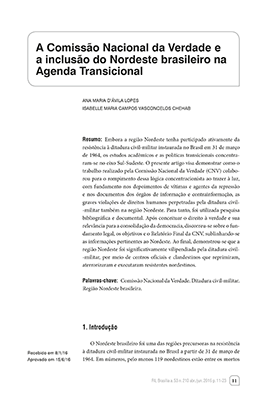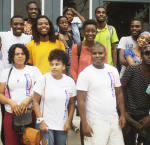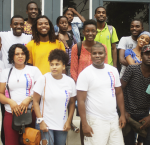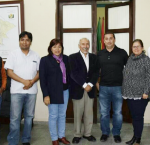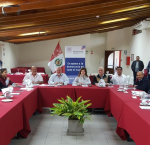https://www.oecd.org/corruption/putting
-an-end-to-corruption.pdf
#BRAZIL - EFFORTS FOR
ALIGNMENT WITH OECD
CONVENTION ON
TRANSNATIONAL BRIBERY
Corruption
is a severe impediment to sustainable economic, political and social
progress for countries at all levels of development. Businesses
forego innovation and competitiveness for bribery, while individuals
within governments divert funds for their own personal use that
should be used to promote the well-being of people.
TRANSNATIONAL
BRIBERY: THE NEW BRAZILIAN NORMATIVE REALITY
Leila Bijos
Antonio Carlos Vasconcellos Nóbrega
ABSTRACT:
The scope of this work is to discuss the new Brazilian regulatory
architecture coming of Law No. 12,846, August 2013, with specific
focus on fighting transnational bribery. It will be presented an
analysis of the iter covered by the international community until it
reached the Convention on Combating Bribery of Foreign Public
Officials in International Business Transactions, Organization for
Economic Cooperation and Development (OECD). In this context, a
specific analysis of the outside circumstances that led to the advent
of the Foreign Corrupt Practices Act – FCPA in the United States,
and the consequences of the adoption of such legislation in the
international context is carried out. As far as the domestic scenario
is concerned, it deserves highlighting the history that led to the
enactment of Law No. 12,846/13 and the need to adapt it to the
aforementioned Convention. Also there will be brought to the fore the
new written rules in this legal status relating to transnational
bribery, in order to understand what impacts are expected in the
country as a result of its effective implementation.
KEYWORDS:
CORRUPTION. TRANSNATIONAL BRIBERY. OCDE.
Como citar este artigo
(ABNT)
BIJOS, Leila; NÓBREGA, Antonio Carlos Vasconcellos. Suborno transnacional: a nova realidade normativa brasileira. Revista de informação legislativa: RIL, v. 52, n. 207, p. 239-259, jul./set. 2015. Disponível em: <http://www12.senado.leg.br/ril/edicoes/52/207/ril_v52_n207_p239>.
BIJOS, Leila; NÓBREGA, Antonio Carlos Vasconcellos. Suborno transnacional: a nova realidade normativa brasileira. Revista de informação legislativa: RIL, v. 52, n. 207, p. 239-259, jul./set. 2015. Disponível em: <http://www12.senado.leg.br/ril/edicoes/52/207/ril_v52_n207_p239>.
(APA)
Bijos, L., & Nóbrega, A. C. V. (2015). Suborno transnacional: a nova realidade normativa brasileira. Revista de informação legislativa: RIL, 52(207), 239-259. Recuperado de http://www12.senado.leg.br/ril/edicoes/52/207/ril_v52_n207_p239
Bijos, L., & Nóbrega, A. C. V. (2015). Suborno transnacional: a nova realidade normativa brasileira. Revista de informação legislativa: RIL, 52(207), 239-259. Recuperado de http://www12.senado.leg.br/ril/edicoes/52/207/ril_v52_n207_p239
registrado em: Artigos
- Portais
- Institucional
- Senadores
- Atividade Legislativa
- Notícias
- Publicação e Documentação
- Orçamento
- Transparência
- e-Cidadania
- Acesso Rápido
- Blog
- Credenciamento de Jornalistas
- Educação a distância
- Jovem Senador
- Procuradoria da Mulher
- Programa de Estágio
- Programa Interlegis
- Visite o Senado
- Fale com os Senadores
- Fale com o Senado
- Congresso NacionalCâmara dos DeputadosTribunal de Contas da União
- Redes Sociais
Senado Federal - Praça
dos Três Poderes - Brasília DF - CEP 70165-900 | Telefone: 0800 61
22 11
Suborno transnacional: a nova realidade normativa brasileira
Leila Bijos
Antonio Carlos Vasconcellos Nóbrega
Resumo
O
escopo do presente trabalho é discorrer sobre a nova arquitetura
normativa brasileira oriunda da Lei nº 12.846, de agosto de 2013,
com enfoque específico no combate à prática delituosa do suborno
transnacional. Será apresentada análise do iter
percorrido pela comunidade internacional até alcançar a Convenção
sobre o Combate da Corrupção de Funcionários Públicos
Estrangeiros em Transações Comerciais Internacionais da
Organização para Cooperação e Desenvolvimento Econômico (OCDE).
Desse modo, uma análise específica das circunstâncias externas
que levaram tanto ao advento do Foreign Corrupt Practices Act –
FCPA nos Estados Unidos, bem como às consequências da adoção de
tal legislação no contexto internacional. No tocante ao cenário
interno, merece destaque o histórico que resultou na promulgação
da Lei nº 12.846/13 e a necessidade de adequação à aludida
Convenção. Também se trazem à baila as novas regras positivadas
nesse estatuto legal relativas ao suborno transnacional, de modo a
compreender quais os impactos esperados no país como consequência
de sua efetiva aplicação.
Palavras-chave
Corrupção. Suborno transnacional. OCDE.
Título, resumo e palavras-chave em inglês
TRANSNATIONAL BRIBERY: THE NEW BRAZILIAN
NORMATIVE REALITY
ABSTRACT: The scope of this work is to discuss
the new Brazilian regulatory architecture coming of Law No. 12,846,
August 2013, with specific focus on fighting transnational bribery.
It will be presented an analysis of the iter covered by the
international community until it reached the Convention on Combating
Bribery of Foreign Public Officials in International Business
Transactions, Organization for Economic Cooperation and Development
(OECD). In this context, a specific analysis of the outside
circumstances that led to the advent of the Foreign Corrupt
Practices Act – FCPA in the United States, and the consequences of
the adoption of such legislation in the international context is
carried out. As far as the domestic scenario is concerned, it
deserves highlighting the history that led to the enactment of Law
No. 12,846/13 and the need to adapt it to the aforementioned
Convention. Also there will be brought to the fore the new written
rules in this legal status relating to transnational bribery, in
order to understand what impacts are expected in the country as a
result of its effective implementation.
KEYWORDS: CORRUPTION. TRANSNATIONAL BRIBERY.
OCDE.
Como citar este artigo
(ABNT)
BIJOS, Leila; NÓBREGA, Antonio Carlos Vasconcellos. Suborno transnacional: a nova realidade normativa brasileira. Revista de informação legislativa: RIL, v. 52, n. 207, p. 239-259, jul./set. 2015. Disponível em: <http://www12.senado.leg.br/ril/edicoes/52/207/ril_v52_n207_p239>.
BIJOS, Leila; NÓBREGA, Antonio Carlos Vasconcellos. Suborno transnacional: a nova realidade normativa brasileira. Revista de informação legislativa: RIL, v. 52, n. 207, p. 239-259, jul./set. 2015. Disponível em: <http://www12.senado.leg.br/ril/edicoes/52/207/ril_v52_n207_p239>.
(APA)
Bijos, L., & Nóbrega, A. C. V. (2015). Suborno transnacional: a nova realidade normativa brasileira. Revista de informação legislativa: RIL, 52(207), 239-259. Recuperado de http://www12.senado.leg.br/ril/edicoes/52/207/ril_v52_n207_p239
Bijos, L., & Nóbrega, A. C. V. (2015). Suborno transnacional: a nova realidade normativa brasileira. Revista de informação legislativa: RIL, 52(207), 239-259. Recuperado de http://www12.senado.leg.br/ril/edicoes/52/207/ril_v52_n207_p239
registrado em: Artigos
- Portais
- Institucional
- Senadores
- Atividade Legislativa
- Notícias
- Publicação e Documentação
- Orçamento
- Transparência
- e-Cidadania
- Acesso Rápido
- Blog
- Credenciamento de Jornalistas
- Educação a distância
- Jovem Senador
- Procuradoria da Mulher
- Programa de Estágio
- Programa Interlegis
- Visite o Senado
- Fale com os Senadores
- Fale com o Senado
- Congresso NacionalCâmara dos DeputadosTribunal de Contas da União
- Redes Sociais
Senado Federal - Praça
dos Três Poderes - Brasília DF - CEP 70165-900 | Telefone: 0800 61
22 11
==//==
SOURCE/LINK:
http://www.cgu.gov.br/assuntos/articulacao-internacional/convencao-da-ocde/arquivos/cartilha-ocde-2016.pdf
OECD
CONVENTION ON TRANSNATIONAL BRIBERY
BOOKLET
==//==
1
2
MINISTÉRIO
DA TRANSPARÊNCIA,
FISCALIZAÇÃO
E CONTROLE – MTFC
SAS,
Quadra 01, Bloco A, Edifício Darcy Ribeiro
70070-905
– Brasília-DF
Torquato
Jardim
Ministro
da Transparência, Fiscalização e Controle
Carlos
Higino Ribeiro de Alencar
Secretário-Executivo
Francisco
Eduardo de Holanda Bessa
Secretário
Federal de Controle Interno
Gilberto
Waller Junior
Ouvidor-Geral
da União
Waldir
João Ferreira da Silva Júnior
Corregedor-Geral
da União
Claudia
Taya
Secretária
de Transparência e Prevenção da Corrupção
==//==
SOURCE/LINK:
https://igarape.org.br/en/securing-the-border-brazils-south-america-first-approach-to-transnational-organized-crime/
Início
» Securing the border: Brazil’s “South America First”
Approach to Transnational Organized Crime
Securing the border: Brazil’s “South America First” Approach to Transnational Organized Crime
Brazil
is at a crossroads in the fight against transnational organized
crime. For one, Brazil is claiming a wider involvement in the
international peace and security agenda and pursuing priorities
overseas. At the same time, the country is adopting what might be
described as a “South American first” approach to dealing with
narco-trafficking, arms smuggling, money laundering and cybercrime.
It consists of investing in subregional institutions and discrete
bilateral agreements in its near abroad. This more localized
approach is contributing to the consolidation of Brazilian state
institutions in its hinterland. But what direction will Brazil take
in the coming decade? This Strategic Paper offers an overview of the
scope and scale of organized crime in Latin America and Brazil more
specifically. It critically reviews Brazil’s normative and
institutional responses – both regional and national – and
considers likely future security postures.
a think and
do tank
Contact
+55 (21) 3496-2113
+55 (21) 3496-2114
contato@igarape.org.br
Rua Miranda Valverde, 64
Botafogo, Rio de Janeiro
RJ – Brasil - 22281-000
+55 (21) 3496-2114
contato@igarape.org.br
Rua Miranda Valverde, 64
Botafogo, Rio de Janeiro
RJ – Brasil - 22281-000
Newsletter
Issues of interest:
Citizen SecurityDrug PolicyCyber SecurityBuilding PeaceSafer Cities
Citizen SecurityDrug PolicyCyber SecurityBuilding PeaceSafer Cities
©
Instituto Igarapé 2017 | design StormDesign.me
| web development FazTI
THE
END

